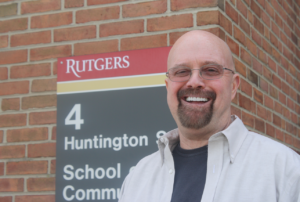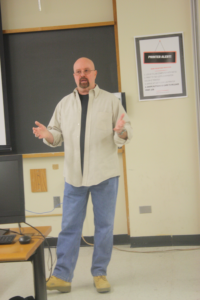A Revealing Talk About Addiction with Rutgers University Students
In a conversation with Rutgers students about addiction, McAlister is honest, vulnerable
By Teresa Politano, Rutgers Journalism Professor and Guest Blogger

Brian McAlister’s revelations are shocking. How he fell in love with alcohol from that first sip of beer, in a cemetery with his friends at 14. How he left home as a teenager and began running drugs from Mexico. How, years later, he chose to abandon his wife and son rather than give up alcohol and drugs. How, on a high, he drove his motorcycle off a cliff in the middle of a desert. How he was rescued from certain death by passers-by, a miracle. How he was flown by chopper to the nearest hospital, how he was nearly paralyzed. How, in another miracle, his leg was not amputated but saved thanks to a new procedure done by a brash young doctor who happened to be in the hospital that day. How, even after all that, McAlister still didn’t realize he was an addict. How, after the surgery, he attached cup-holders to his crutches so he could continue to drink beer while he was on the mend.
McAlister does not preach. His voice is gentle, and he speaks quietly. In a recent conversation at Rutgers University, every student in the class was rapt, still, alert to each word. McAlister stood tall; he was sure but humble. He wore a freshly ironed shirt, impossibly crisp, a pair of well-loved jeans, Timberlands.
The content of McAlister’s story is often raw, but this is not why students were engaged. McAlister makes no apologies, expresses no regrets, does not sugarcoat. He challenged each person in the room to work toward a better self. McAlister walks the class through his life. As a working-class drunk from Harrison, which at the time was a New Jersey town with the most bars per capita in the nation. As a CEO, with a luxurious home in a bucolic neighborhood. As a father, a husband. As an author. As an addict. McAlister is all those things, but most of all he is honest and vulnerable. His story is real. His pain is real. His success is real. He is fearless, but he is also humble. It resonates. Most students were profoundly inspired by McAlister’s visit, and several considered it the best lecture of their lives.
Students grew up in addicted world, yet know little
Statistics indicate that this roomful of Rutgers students is likely familiar with addiction. In America, addiction has become an epidemic. Addiction affects one in five people. Many of these students, in fact, have witnessed firsthand the suffering of a loved one. Others worry about their own behavior. Is the college party scene simply a rite of passage or does it encourage a lifetime of substance abuse? What about genetics? Addiction runs in families, but what does that even mean?
On this spring morning, 22 juniors and seniors at Rutgers University heard the story of Brian McAlister; his intimate, informal conversation was followed by a Q&A session that lasted nearly an hour. Even a casual observer would be surprised by the level of engagement. These students grew up in the Information Age, and their generation is more open, tolerant and self-aware than any previous generation. Addiction, as one student noted, is a topic that permeates the media, and we all are well-aware that addiction is dangerous and pervasive. Yet, following McAlister’s visit, the most common takeaway from the class was this: We think we know addiction. We really don’t know much at all.
What is evident is this: College students are eager and desperate for the truth about addiction.
In the media, addiction is often romanticized, as one student said. We see addiction as an illness that plagues celebrities and artists. We associate substance use, misuse and addiction with creativity, a genius archetype, a beautiful tragedy.
 Other myths about addiction dispelled
Other myths about addiction dispelled
McAlister laid bare other common myths. Most students, for example, seem aware that addiction is a disease, but don’t fully grasp what that means. It was particularly illuminating when McAlister revealed the grip of addiction on his life, how he didn’t stop, even in the face of losing his wife and son, even after he literally drove off a cliff. How he wanted, simply, to die. It was a powerful moment amid a morning of powerful moments. As one student suddenly realized: McAlister couldn’t just quit.
Many students had questions about friends and family members of addicts. What can be done?McAlister answered with tough love. If someone you know is an addict, you need to recognize you are powerless against the disease, and you need to set boundaries. In many ways, McAlister said, friends and family members are just as unwell as the addict. It was another powerful, eye-opening moment.
Students were particularly curious about details regarding family traits. We know that addiction runs in families; how does that work? One student had a vague understanding that her grandfather was an addict, but she had never been told the full story and never knew where he went at night. “I just knew he was responsible for bringing the cookies to each meeting.” That student was startled by McAlister’s frankness, how he confronted the issue directly with his son Rory. “Knowing that this is something that can potentially affect my kids,” she said, “I have to be aware of how I can combat this. I am prepared to make tough decisions.”
Most in the class were surprised to learn that McAlister, 28 years sober, still goes regularly to meetings. “I am not a former addict,” he said. “I am an addict.”
“Once an addict, always an addict.”
Do you want to be mediocre?
McAlister noted that he is changing the face of addiction simply by showing his face. Many recovery programs safeguard the anonymity of the addict. McAlister agrees that the stigma of addiction can be debilitating, but he also argues that it’s difficult for treatment to move forward when everything is deliberately kept under wraps. In his own life, he was warned that going public would ruin his career. The opposite has happened.
For students, the most inspirational part of the morning was when McAlister spoke in praise of the personality traits of an addict. Single-mindedness and defiance are positive attributes, he said. They are the exact traits that have led to his success. McAlister, drunk or sober, always wants more from life.
Indeed, McAlister urged each student to strive toward a better self. When one student expressed her desire to someday become a writer, he turned to her directly and asked: “Did you write something today?” The room chilled, as if a harsh wind had blown through. To a roomful of young writers, McAlister’s remark seemed savage. But, as the students agreed later, McAlister’s point was more than fair. Success is not a someday proposition.
Freedom from Drug Addiction in the Palm of Your Hand
Freedom 365™ is designed to help you redirect your behavior and move you beyond abstinence. It can help you realign the perceptions that have been holding you back. It’s possible to rewrite the software in your mind so that you don’t react the same way to triggers. Freedom 365 Virtual Recovery System™ adheres to the strict HIPAA and FERPA compliance standards, all while remaining accessible anytime, anywhere, 24/7, 365 days a year.
Click here to learn how it works.



